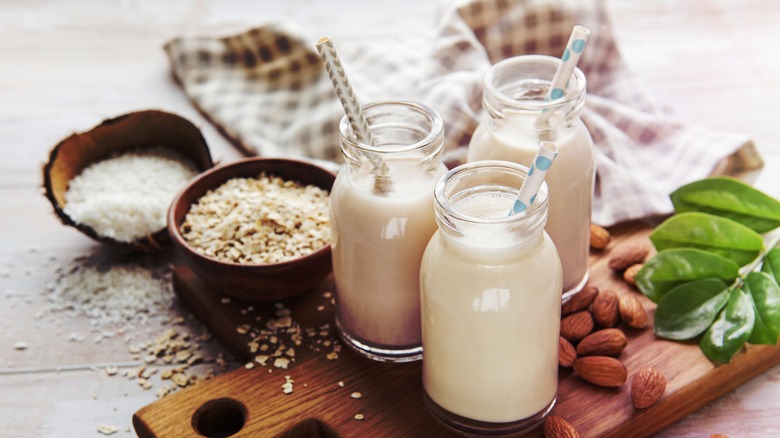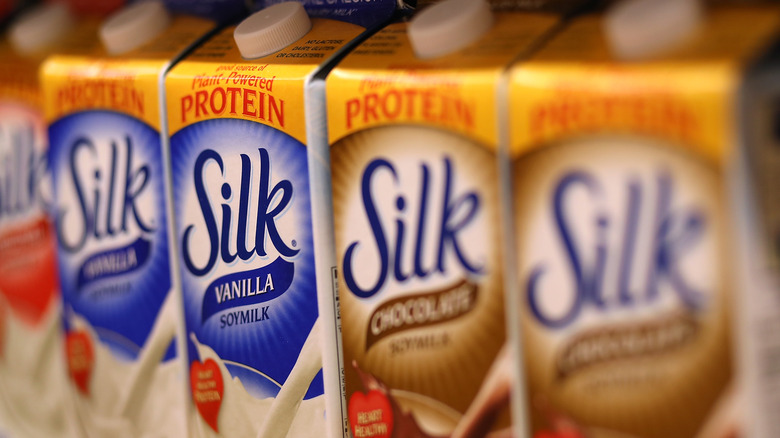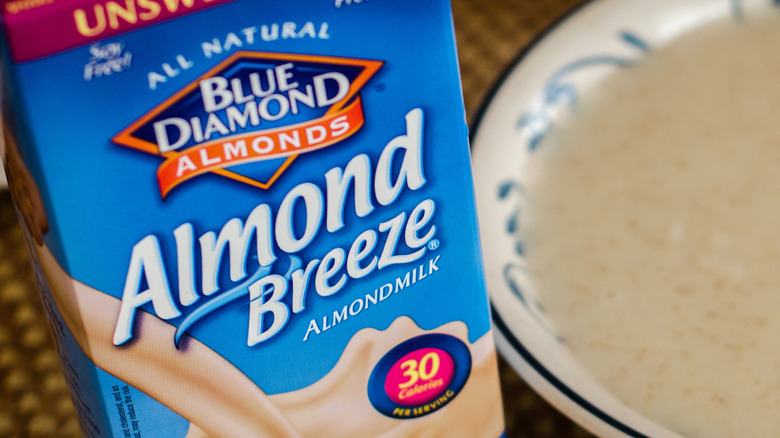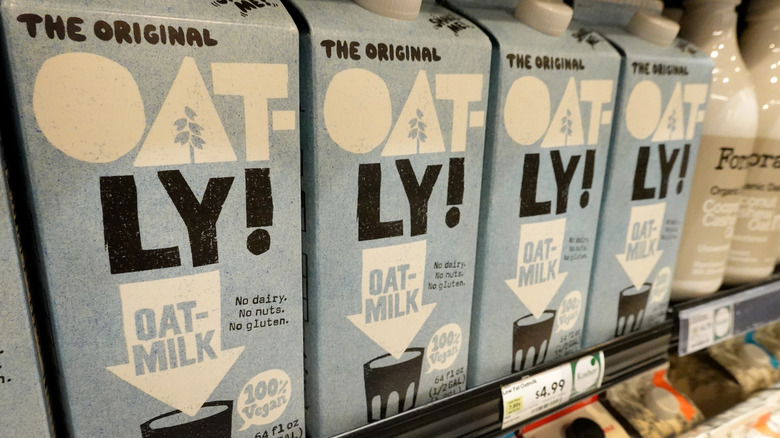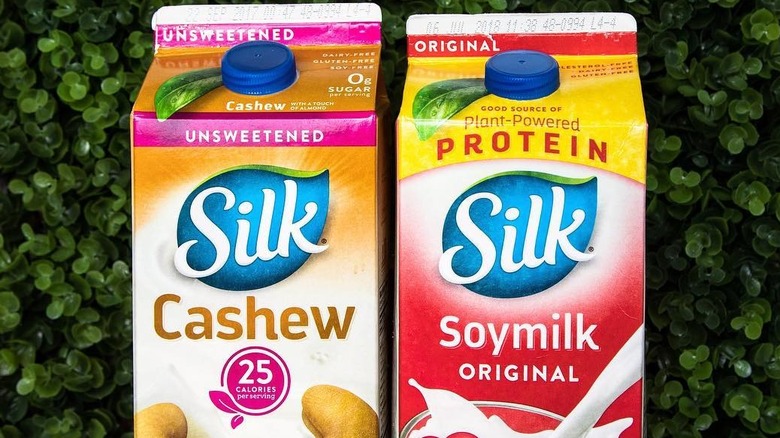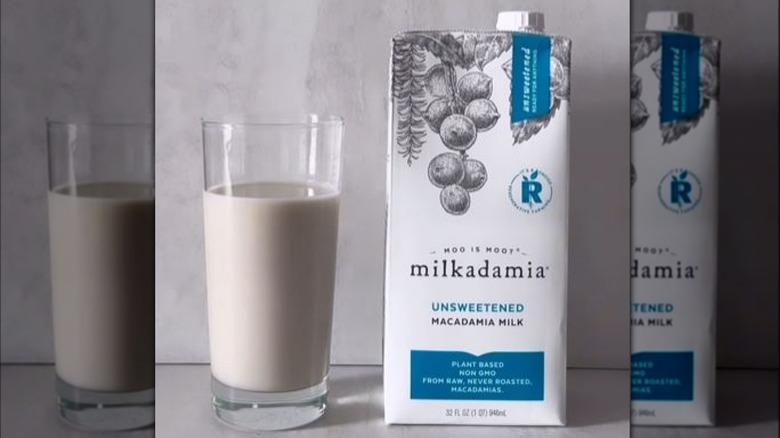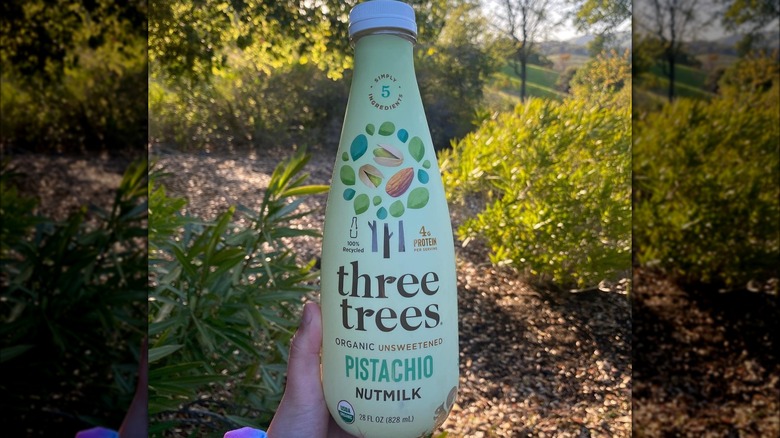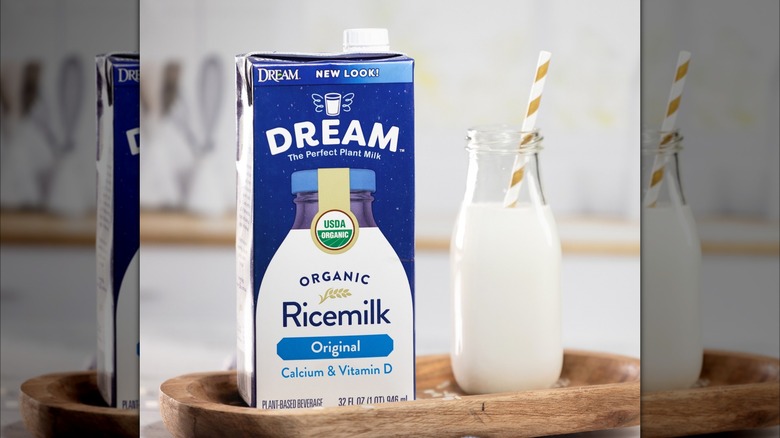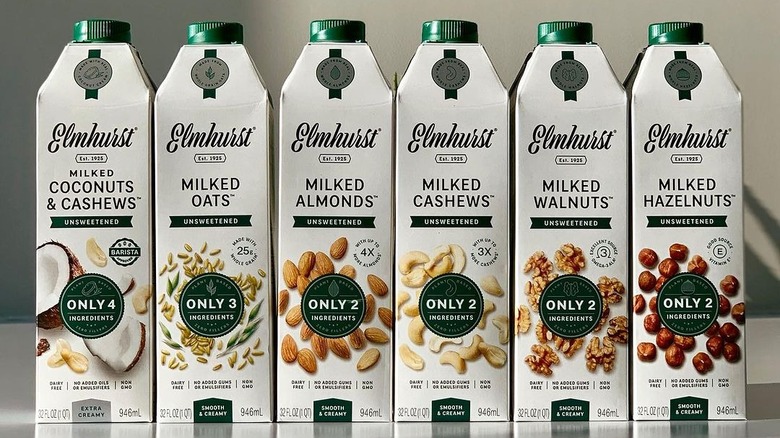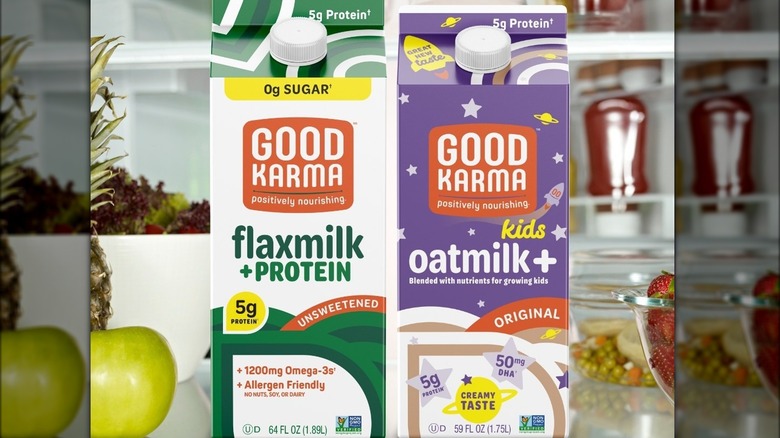10 Non-Dairy Milks Made From The Best Ingredients
Just a few years ago, many people scoffed at dairy milk alternatives. Now, non-dairy milk has flooded the market, gaining more and more popularity. There are so many options, from oat milk to soy milk to almond milk, that it can be difficult to know which type of non-dairy milk is best for you. On top of that, there are so many different brands of each type of milk; how do you decide? Which milk is the healthiest? Which works best with your specific diet? Most non-dairy milks have added ingredients; which of these are healthy, and which ones aren't?
In general, milk alternatives will have some sort of thickener, such as locust bean gum or gellan gum. These are intended to make the milk thick and creamy, and are usually considered safe and healthy. Similarly, sunflower lecithin is a common additive that is meant to keep ingredients from separating in the bottle or carton. This ingredient is considered safe to consume and contains many necessary vitamins and minerals. Beyond these few additives, however, it can be extremely difficult to know what is good and what is bad for you. To make it as easy as possible to choose which milk alternative is best, we put together a list of the non-dairy milks made from the absolute best ingredients.
1. Silk soy milk
Soy milk is one of the original dairy-free milk options, popular among the lactose intolerant and vegan crowds far before non-dairy milk came into the limelight. Silk, now a household brand name, carries one of the best soy milks out there. Soy milk is made when soybeans soaked in water are blended with water and then strained. Silk soy milk contains soybeans, water, cane sugar (in the sweetened version), added vitamins and minerals, salt, and gellan gum. Gellan gum is a plant-based alternative to gelatin and is widely considered safe and relatively healthy. This simple ingredient list shows why this brand of soy milk is so great, and also explains why it doesn't have the strange aftertaste that many soy milk drinkers complain of.
Soy milk is a good replacement for traditional cow milk in almost every recipe and cup of coffee. It is also a healthy milk, with one cup of Silk soy milk boasting 110 calories (compared to 149 for a cup of whole milk). It also has a similar amount of protein (both contain roughly 8 grams per cup), which makes it the highest-in-protein milk alternative on this list. Silk soy milk is also fortified with many of the vitamins that you would benefit from when drinking cow's milk, including significant portions of both vitamin D and calcium. This milk is also pretty affordable, especially compared to some other non-dairy milk options, usually priced somewhere between $2.99 (at Kroger) and $3.99 (at Target).
2. Almond Breeze almond milk
Almond milk, similarly to soy milk, is made by blending soaked, softened almonds with water and other additives. Blue Diamond Almond Breeze, for example, is made with almonds, filtered water, added vitamins and minerals, sunflower lecithin, and gellan gum. While gellan gum is used as a thickener, sunflower lecithin is meant to prevent separation between the almonds and water. When it comes to milk alternatives, the shorter the ingredient list, the better, and this short ingredient list has just the necessities for a great glass of milk alternative.
Almond milk, like any product, has its pros and cons, especially in comparison to dairy milk. Almond milk is lower in calories, with Blue Diamond almond milk sitting at right around 60 calories per cup. It is also lower in other nutritional aspects, however, boasting only 1 gram of protein per serving and 7 grams of added sugars for the sweetened version. It is pretty high in calcium and vitamin D. It is also very high in vitamin E, with 50% of your daily value of the important antioxidant in just one cup. Blue Diamond milk is also pretty affordable, usually costing somewhere between $2.99 (Target) and $3.38 (Walmart).
One important thing to note about almond milk is that farming the almonds for just one liter of milk takes 371 liters of water, which can be harmful to the environment, especially considering that almonds tend to be farmed in regions that are vulnerable to drought, such as California.
3. Oatly oat milk
Oat milk has quickly become one of the most popular non-dairy milk alternatives out there because of its creamy texture, minimal environmental impact, and reasonable price. Oat milk consists of steel-cut oats soaked in water and then blended, as well as other additives. While oat milk has become the standout among milk alternatives, one brand stands far above the rest both in terms of ingredients and popularity.
Oatly oat milk has a pretty simple list of ingredients, made up of oats, water, low erucic acid rapeseed oil, and added vitamins and minerals. While oil in your milk might not sound great, the small amount of oil that is added is meant to make the oat milk creamier. Since oats are so low in fat naturally, this milk isn't higher in fat than other milk alternatives. Similarly to other non-dairy milk alternatives, it is fortified with calcium and vitamin D, so its nutritional value is pretty similar to that of dairy milk. Oatly also has significant amounts of vitamin B12 and riboflavin. Because of the protein content of oats, Oatly has less protein than cow milk and soymilk, but more than almond and other nut milks, with about 3 grams of protein per cup of milk.
Oat milk, while costing more than soy milk, is still reasonably priced, costing between $4.49 (Kroger) and $5.39 (Target) for half a gallon of milk. Considering the great ingredients, taste, and minimal environmental impact, the price tag might just be worth it.
4. Silk cashew milk
Silk doesn't just do soy milk — their cashew milk is also a huge winner. Cashew milk, another nut milk made with soaked cashews and water, is an extremely creamy milk alternative that, while not the most popular, is one of the healthiest and most delicious. It happens to be one of the lowest-calorie milk options, sitting at only 25 calories per cup (as opposed to 149 for whole milk). While it is low in protein (with 1 gram per cup), it is fortified with vitamins and minerals such as vitamin D and calcium, and is naturally high in vitamin E.
Silk cashew milk also boasts a pretty straightforward ingredient list. It contains cashews, water, almonds, a vitamin and mineral blend, locust bean gum, natural flavor, gellan gum, and ascorbic acid. The two different types of gums are simply thickeners, while ascorbic acid is just vitamin C intended to preserve freshness. While the ingredient list is a little long for this milk, the ingredients are honest and straightforward, working together to create an extremely creamy, low-calorie milk with only 3 grams of fat per cup.
Most reviews of this milk are overwhelmingly positive, with one person commenting on the Silk website, "Creamy and neutral tasting, it cooks and bakes like dairy milk in my recipes. I am so, so happy with this product! Please don't stop making it!" On top of that, cashew milk requires less water to produce than almond milk, making it a better environmental option.
5. Sproud pea milk
Okay, so pea milk is a little bit more out there than the other milk alternatives that we have discussed so far, but if you are searching for a milk alternative that is high in protein, pea milk may be the way to go. Sproud makes a straightforward pea milk which is made using pea protein derived from yellow peas that have been ground into flour.
Once named the best milk for lattes, this milk alternative is extremely creamy, foams very nicely, and tastes vaguely like cocoa. The ingredients in Sproud are also very pretty simple. Made with water, pea protein, agave syrup, rapeseed oil, oat oil, and some vitamins and minerals, Sproud uses only the necessary ingredients. The oils in this milk add some much-needed fat and creaminess, and many fats are quite healthy. This milk also has 5 grams of protein and 90 calories per cup, making it one of the more protein-rich milk alternatives. Also fortified with plenty of vitamins and minerals, Sproud has more calcium than even regular cow's milk, making it a pretty good dietary replacement. Pea milk is also an environmentally friendly option because yellow peas are cheap and easy to grow. The only downside is that pea milk isn't widely available to buy in stores. That said, it is available at some grocery stores; Kroger carries it, and it is easily purchasable on Amazon, where it costs $29.99 for a pack of six.
6. Milkadamia macadamia milk
Macadamia milk is another delicious milk alternative. While it is more niche than almond or even cashew milk, this super-creamy nut milk is a great choice for coffee. Milkadamia milk is healthy too. Each cup of the unsweetened version is only 40 calories, and the added pea protein gives this milk alternative its single gram of protein per serving. Like other milk alternatives, Milkadamia is fortified with vitamins and minerals, including calcium and vitamin D. In addition to a mix of vitamins and minerals, the ingredients follow the same formula that you are, by this point, familiar with. Milkadamia milk contains macadamia nuts, water, guar gum, natural flavors, pea protein, sunflower lecithin, sea salt, and gellan gum. While this milk contains more additives than many of the other kinds of milk in this list, the benefits outweigh the cost. The unsweetened version of this milk is especially healthy because there is less sugar and less processed.
Macadamia milk is a great choice for those following a low-carb or even a ketogenic diet because it is high in healthy fats and low in carbohydrates. Drinkers of this milk have great things to say too; one reviewer wrote on the Milkadamia website, "This milk is so rich and smooth, with none of that "off" aftertaste that most milk alternatives have ..." While not the cheapest option on this list, Milkadamia is still relatively affordable, costing $4.49 at Target or $27.90 for a pack of 6 on Amazon.
7. Three Trees pistachio milk
Three Trees pistachio milk, while it serves its own delicious purpose, cannot always be used as a replacement for cow's milk because it has a very unique flavor profile. Still, if you are a pistachio fan, this milk is an excellent option for coffee, smoothies, cereal, and beyond, both in terms of flavor and health benefits.
This may be one of the best options on this list, at least in terms of its ingredients, which are extremely simple. In Three Trees pistachio milk, you will find water, organic pistachios, organic almonds, Himalayan salt, and organic almond extract. The brand even notes that it does not use any emulsifiers; separation is natural, and you just have to shake your bottle of milk before using it. On top of that, Three Trees guarantees that all of its milk is certified organic and non-GMO.
This nut milk contains a significant amount of nuts (4 times the other leading nut milk brands, according to Three Trees), so it is pretty high in both protein and healthy fats, boasting 4 grams of protein and 8 grams of fat per serving. One downside of the simple ingredient list is that this milk is not fortified with vitamins and minerals, meaning that it cannot replace dairy milk as a source of calcium, vitamin D, and other vitamins and minerals. This also happens to be one of the most expensive milks on the list, costing between $7.49 (Whole Foods) and $8.58 (Walmart).
8. Dream rice milk
When it comes to milk alternatives, you can't go wrong with an ingredient list that is only four ingredients long. This is what Dream rice milk boasts, a non-dairy milk alternative that has roots as far back as the 1970s. In Dream's original rice milk, you will find water, rice, canola and/or sunflower oil, and sea salt. That said, Dream offers several different varieties, including milk fortified with vitamins and minerals, "whole" milk, and 2% milk, with different amounts of healthy fats to mimic dairy milk.
Rice milk is a great alternative for those avoiding both dairy and nuts, placing it in the unique genre of milk alternatives that can be consumed by pretty much any diet. This is a huge benefit for those with allergies or lactose intolerances. Each cup of Dream rice milk is about 120 calories, compared to 149 for whole milk. It is also important to note that while there are 11 grams of sugar per serving, this is not added cane sugar, but rather sugar that is produced by the rice during the milk-making process. There are also few vitamins and minerals in this milk because of the short ingredient list (unless you specifically buy the vitamin D and calcium version of the milk). Dream rice milk is also pretty affordable, costing between $3.64 (Walmart) and $4.99 (Target), and can be found at most grocery stores. Altogether, this classic non-dairy milk option is a great choice.
9. Elmhurst hazelnut milk
Elmhurst's hazelnut milk has two ingredients: hazelnuts and water. This is the simplest ingredient list on our list of non-dairy milk alternatives, making this a great option for super creamy coffee or even on its own.
Hazelnut milk is another rich nut milk that is rich in fat but low in calories, with more protein than almond milk. Elmhurst's milk has 90 calories and 9 grams of fats per cup, as well as 2 grams of protein. While this milk is not fortified with vitamins and minerals, and therefore is not a nutritional replacement for dairy milk, it is packed with a good amount of vitamin E and even some iron. Additionally, hazelnut milk is one of the best nut milks for the planet, because it doesn't take much water to farm them. Hazelnuts grow on robust trees that can survive easily, which means that they don't need as much water as, for example, almond crops.
Considering how creamy Elmhurst hazelnut milk is, a little bit goes a long way, especially in coffee. This milk is a little bit on the pricier side, but it can be bought directly from Elmhurst for $12.58 for a pack of two. Walmart and other groceries also carry the brand, where it usually costs around $5.99 for a bottle. This milk is loved by its consumers; one person wrote on the Elmhurst website, "Delicious! A rare find with fewer ingredients!" which sums up Elmhurst's milk nicely.
10. Good Karma flax milk
For another milk alternative that is full of healthy fats, try something unique with Good Karma flax milk. Flax milk is made similarly to other milk alternatives, but it uses cold-pressed flax oil instead of straight-up flax seeds. This milk alternative is fortified with vitamins and minerals, including calcium and vitamin D, and also has a huge amount of vitamin B12.
Flax seeds also happen to be very good for the heart because they are full of omega-3 fatty acids, which are known to reduce the risk of cancer and heart disease, among other benefits. Good Karma's flax milk boasts a pretty straight-up ingredient list, with water and flax oil making up a vast majority of the product and some pea starch added in. One cup of Good Karma's flax milk has only 25 calories, making it one of the lowest-calorie milks on this list. It also has 2.5 grams of healthy fats and no sugar.
Unfortunately, this milk also has no protein, which means that you will need to source your protein elsewhere. That said, Good Karma does make a version of their flax milk with plant protein added in, and this version boasts 5 grams of protein per serving. Perhaps the biggest downside to this milk is that it is difficult to find in stores. However, a pack of 6 can be purchased on Good Karma's website for $28.79. It is also available at Whole Foods and Amazon for $5.69 per carton.
